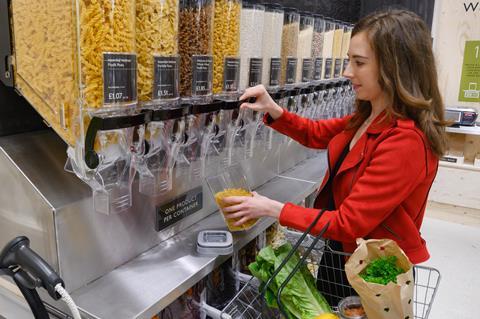
The war on plastic will be lost unless the industry takes “rapid” and “high impact” action to switch to mass use of refill and reuse technology, a major new report by IGD has warned.
The document, authored on behalf of the body by sustainability experts Anthesis, claims industry trials of new models to shift the public from single-use plastic have been relegated to the fringes because they are not financially viable in the short term.
IGD, which said it had been approved by “senior industry stakeholders” from supermarkets and food manufacturers to set out what needed to be done to rescue efforts, said the entire financial model for packaging needed to be re-assessed if it was to succeed.
The report is titled ‘Delivering More Sustainable Packaging Systems: The Business Case and Calls to Action for Industry and Policymakers’. It warns that while businesses have made changes, they are not going fast enough and action is needed across the supply chain to move to more sustainable packaging.
It says reuse technologies need to be implemented “at scale” to overcome operational and commercial barriers instead of by isolated trials.
“Reuse is currently on the edge of packaging sustainability focus, and so a concerted, collaborative effort is required,” the report concludes. It adds: “Some retailers and brands are trialling new prefill and refill initiatives, but many have not yet scaled and currently consumer uptake is therefore low.”
The report highlights the work carried out by Aldi and Ocado to trial refill in-store and consumer returnable online, as part of the Refill Coalition, run by GoUnpackaged.
It said Aldi’s pilot, while in its early stages, was showing signs of commercial success.
However, other efforts have been wound down, notably Tesco’s trial with reusable packaging company Loop. The Grocer revealed in July 2022 it had been quietly wound up, with the retailer admitting such initiatives would require a major consumer mindshift before they could be viable.
The trial, involving companies such as Coca-Cola, Heinz, Persil and Tetley, featured refillable aisles in 88 branded and own-label products in reusable and durable packaging, and had originally been intended to be rolled out more widely.
Other supermarkets, including Asda and Waitrose, have been trialling refillable technologies but it has failed to become a mainstream offer amid the cost of living crisis.
Read more: Digital deposit scheme rivals Polytag and DDRS Alliance join forces
IGD’s report, which is supported by 43 supermarkets, suppliers and food industry bodies, concludes that such scaling for reuse can only be achieved through pre-competitive collaboration across the value chain, involving significant investment in collective infrastructure and with a policy development that encourages the transition.
It says the industry needs to “explore financial investment options to assist with designing, managing and scaling reuse infrastructure, including creating a shared reusable packaging solution”.
It should also “consider how to adjust the current near-term approach to assessing profit cycles to align with long-term investment and asset building needed for reuse.”
Fiona Powell, head of sustainability at IGD, said: “To build a sustainable, circular packaging system, rapid, high-impact action is needed across the supply chain.
“Whilst changes are being made in response to regulatory demands, business pressures and environmental concerns, these are not going fast or far enough to tackle the scale of the challenge faced.
“Circular systems, which includes reuse (prefill and refill), have the most potential to deliver impact. This means shifting from the single-use packaging systems we have today to a more sustainable model.”



















No comments yet